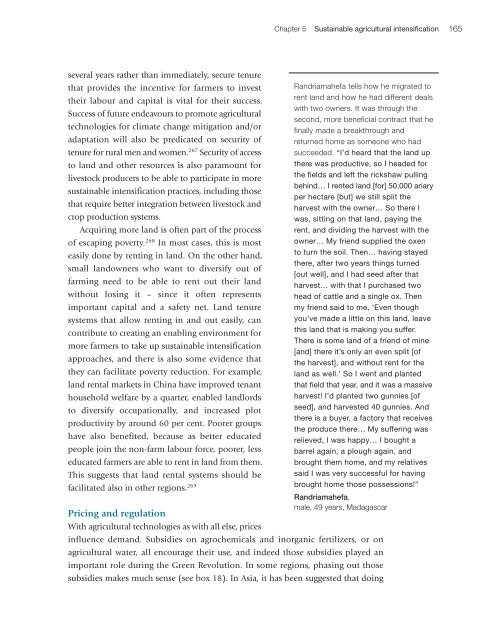English - IFAD
English - IFAD
English - IFAD
You also want an ePaper? Increase the reach of your titles
YUMPU automatically turns print PDFs into web optimized ePapers that Google loves.
Chapter 5 Sustainable agricultural intensification 165<br />
several years rather than immediately, secure tenure<br />
that provides the incentive for farmers to invest<br />
their labour and capital is vital for their success.<br />
Success of future endeavours to promote agricultural<br />
technologies for climate change mitigation and/or<br />
adaptation will also be predicated on security of<br />
tenure for rural men and women. 267 Security of access<br />
to land and other resources is also paramount for<br />
livestock producers to be able to participate in more<br />
sustainable intensification practices, including those<br />
that require better integration between livestock and<br />
crop production systems.<br />
Acquiring more land is often part of the process<br />
of escaping poverty. 268 In most cases, this is most<br />
easily done by renting in land. On the other hand,<br />
small landowners who want to diversify out of<br />
farming need to be able to rent out their land<br />
without losing it – since it often represents<br />
important capital and a safety net. Land tenure<br />
systems that allow renting in and out easily, can<br />
contribute to creating an enabling environment for<br />
more farmers to take up sustainable intensification<br />
approaches, and there is also some evidence that<br />
they can facilitate poverty reduction. For example,<br />
land rental markets in China have improved tenant<br />
household welfare by a quarter, enabled landlords<br />
to diversify occupationally, and increased plot<br />
productivity by around 60 per cent. Poorer groups<br />
have also benefited, because as better educated<br />
people join the non-farm labour force, poorer, less<br />
educated farmers are able to rent in land from them.<br />
This suggests that land rental systems should be<br />
facilitated also in other regions. 269<br />
Pricing and regulation<br />
With agricultural technologies as with all else, prices<br />
Randriamahefa tells how he migrated to<br />
rent land and how he had different deals<br />
with two owners. It was through the<br />
second, more beneficial contract that he<br />
finally made a breakthrough and<br />
returned home as someone who had<br />
succeeded. “I’d heard that the land up<br />
there was productive, so I headed for<br />
the fields and left the rickshaw pulling<br />
behind… I rented land [for] 50,000 ariary<br />
per hectare [but] we still split the<br />
harvest with the owner… So there I<br />
was, sitting on that land, paying the<br />
rent, and dividing the harvest with the<br />
owner… My friend supplied the oxen<br />
to turn the soil. Then… having stayed<br />
there, after two years things turned<br />
[out well], and I had seed after that<br />
harvest… with that I purchased two<br />
head of cattle and a single ox. Then<br />
my friend said to me, ‘Even though<br />
you’ve made a little on this land, leave<br />
this land that is making you suffer.<br />
There is some land of a friend of mine<br />
[and] there it’s only an even split [of<br />
the harvest], and without rent for the<br />
land as well.’ So I went and planted<br />
that field that year, and it was a massive<br />
harvest! I’d planted two gunnies [of<br />
seed], and harvested 40 gunnies. And<br />
there is a buyer, a factory that receives<br />
the produce there… My suffering was<br />
relieved, I was happy… I bought a<br />
barrel again, a plough again, and<br />
brought them home, and my relatives<br />
said I was very successful for having<br />
brought home those possessions!”<br />
Randriamahefa,<br />
male, 49 years, Madagascar<br />
influence demand. Subsidies on agrochemicals and inorganic fertilizers, or on<br />
agricultural water, all encourage their use, and indeed those subsidies played an<br />
important role during the Green Revolution. In some regions, phasing out those<br />
subsidies makes much sense (see box 18). In Asia, it has been suggested that doing

















